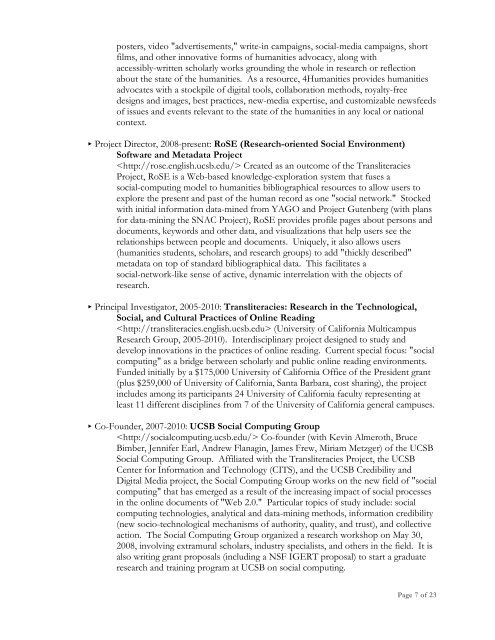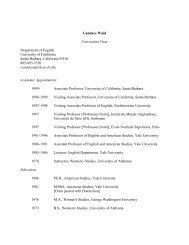Alan Y. Liu - English Department - University of California, Santa ...
Alan Y. Liu - English Department - University of California, Santa ...
Alan Y. Liu - English Department - University of California, Santa ...
You also want an ePaper? Increase the reach of your titles
YUMPU automatically turns print PDFs into web optimized ePapers that Google loves.
posters, video "advertisements," write-in campaigns, social-media campaigns, short<br />
films, and other innovative forms <strong>of</strong> humanities advocacy, along with<br />
accessibly-written scholarly works grounding the whole in research or reflection<br />
about the state <strong>of</strong> the humanities. As a resource, 4Humanities provides humanities<br />
advocates with a stockpile <strong>of</strong> digital tools, collaboration methods, royalty-free<br />
designs and images, best practices, new-media expertise, and customizable newsfeeds<br />
<strong>of</strong> issues and events relevant to the state <strong>of</strong> the humanities in any local or national<br />
context.<br />
� Project Director, 2008-present: RoSE (Research-oriented Social Environment)<br />
S<strong>of</strong>tware and Metadata Project<br />
Created as an outcome <strong>of</strong> the Transliteracies<br />
Project, RoSE is a Web-based knowledge-exploration system that fuses a<br />
social-computing model to humanities bibliographical resources to allow users to<br />
explore the present and past <strong>of</strong> the human record as one "social network." Stocked<br />
with initial information data-mined from YAGO and Project Gutenberg (with plans<br />
for data-mining the SNAC Project), RoSE provides pr<strong>of</strong>ile pages about persons and<br />
documents, keywords and other data, and visualizations that help users see the<br />
relationships between people and documents. Uniquely, it also allows users<br />
(humanities students, scholars, and research groups) to add "thickly described"<br />
metadata on top <strong>of</strong> standard bibliographical data. This facilitates a<br />
social-network-like sense <strong>of</strong> active, dynamic interrelation with the objects <strong>of</strong><br />
research.<br />
� Principal Investigator, 2005-2010: Transliteracies: Research in the Technological,<br />
Social, and Cultural Practices <strong>of</strong> Online Reading<br />
(<strong>University</strong> <strong>of</strong> <strong>California</strong> Multicampus<br />
Research Group, 2005-2010). Interdisciplinary project designed to study and<br />
develop innovations in the practices <strong>of</strong> online reading. Current special focus: "social<br />
computing" as a bridge between scholarly and public online reading environments.<br />
Funded initially by a $175,000 <strong>University</strong> <strong>of</strong> <strong>California</strong> Office <strong>of</strong> the President grant<br />
(plus $259,000 <strong>of</strong> <strong>University</strong> <strong>of</strong> <strong>California</strong>, <strong>Santa</strong> Barbara, cost sharing), the project<br />
includes among its participants 24 <strong>University</strong> <strong>of</strong> <strong>California</strong> faculty representing at<br />
least 11 different disciplines from 7 <strong>of</strong> the <strong>University</strong> <strong>of</strong> <strong>California</strong> general campuses.<br />
� Co-Founder, 2007-2010: UCSB Social Computing Group<br />
Co-founder (with Kevin Almeroth, Bruce<br />
Bimber, Jennifer Earl, Andrew Flanagin, James Frew, Miriam Metzger) <strong>of</strong> the UCSB<br />
Social Computing Group. Affiliated with the Transliteracies Project, the UCSB<br />
Center for Information and Technology (CITS), and the UCSB Credibility and<br />
Digital Media project, the Social Computing Group works on the new field <strong>of</strong> "social<br />
computing" that has emerged as a result <strong>of</strong> the increasing impact <strong>of</strong> social processes<br />
in the online documents <strong>of</strong> "Web 2.0." Particular topics <strong>of</strong> study include: social<br />
computing technologies, analytical and data-mining methods, information credibility<br />
(new socio-technological mechanisms <strong>of</strong> authority, quality, and trust), and collective<br />
action. The Social Computing Group organized a research workshop on May 30,<br />
2008, involving extramural scholars, industry specialists, and others in the field. It is<br />
also writing grant proposals (including a NSF IGERT proposal) to start a graduate<br />
research and training program at UCSB on social computing.<br />
Page 7 <strong>of</strong> 23



